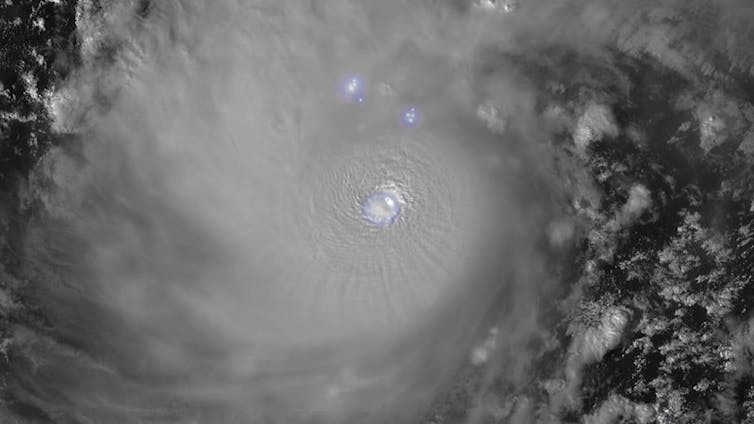Terminations at U.S. government agencies that monitor extreme weather events will have neg
April 13, 2025
In August 2021, the Intergovernmental Panel on Climate Change Report confirmed that the climate is warming and the impacts will be widespread and more intense than anticipated.
In 2023, the National Oceanic Atmospheric Administration (NOAA) released the Weather, Water, and Climate Strategy (2023-27) for the United States and around the world.
The strategy addresses the risks to lives, property, economies and ecosystems that are increasing at an alarming rate due to the warming planet. It highlights that U.S. citizens are in harm’s way, infrastructure is increasingly outdated and at risk and, in many places, not designed for new environmental realities and extreme weather events.
In February 2025, Donald Trump’s administration reduced the government’s size. The NOAA was severely affected, experiencing budget cuts and the termination of about 800 employees’ positions. NOAA is a critically important government organization, and includes the National Weather Service (NWS).

(AP Photo/Paul Sancya)
Recent developments regarding science and scholarship in the U.S., including major reductions in federal research funding and censorship around topics such as climate change and gender, are forcing many U.S. science agencies and research organizations to abruptly suspend normal operations.
As former assistant deputy minister of the Meteorological Service of Environment Canada between 1994 and 2000, I regularly met with my colleagues at the NWS and other weather agencies. We worked together to share information to provide the best weather services possible in our countries.
Climate and misinformation
In January of this year, the World Economic Forum released its Global Risks Report. This ranked the global risks that could have major impacts on the global population, GDP or natural resources in the short term (two years) and long term (10 years).
For the short term, the top risk identified is “misinformation and disinformation,” with “extreme weather events” being the second-highest risk. Extreme weather events include storms, floods, wildfires, heat and others, with a warming climate leading to more severity and impacts. By geography, extreme weather events is ranked as the highest risk for Northern America and most other regions.
The risks due to misinformation and extreme weather events are interconnected. If an extreme weather event is about to occur and people are not informed, or are misinformed, about the occurrence and risks, they do not take actions to reduce exposure and vulnerability, resulting in higher impacts.
Impacts of layoffs
Because of the importance of the NOAA, NWS and other climate research bodies, many have spoken out about the negative impacts of these job terminations and budget reductions.
The NWS has developed leading weather forecast models by working with the academic and global science communities, and partners with others beyond national borders to share their data. The multi-year development and implementation of these weather systems has led to high quality and reliable information for weather, climate and ocean situations.
One example is science journalist Andy Revkin, who referred to Trump’s actions as “The Dangerous Trump Purge of Weather and Climate Expertise.” In his Substack, Revkin writes:
“There’s an enormous, and justified surge of criticism from private-sector and academic meteorologists from across the political spectrum over the purge of expertise and supporting staff under way at the National Oceanic and Atmospheric Administration and National Weather Service.”
Meteorologists Jeff Masters and Bob Henson wrote that “cuts to U.S. weather and climate research could put public safety at risk… and slow emergency disaster response and weaken resilience efforts.”
Ilan Kelman, professor of disasters and health at University College London, stated that the “mass job termination” will have major negative impacts across the U.S. and nearby countries, such as Canada. This will be due to reduced aviation and shipping safety; lack of information for communities to respond to severe weather; safety assessments for search-and-rescue; and other concerns.
Alarming increases
With a warming climate, the impacts of extreme weather events are rising around most of the world. The year 2024, the warmest on record, was also the single-most expensive year on record in terms of Canadian insurance payouts of C$8.5 billion, with the number of catastrophe claims exceeding 273,000. Disaster costs in the U.S. also increased with many billion-dollar events.

(GOES-19/NOAA)
In September 2024, Hurricane Helene caused 228 deaths and economic losses assessed at US$78.7 billion. In advance of Helene’s landfall, states of emergency in Florida and Georgia were declared by the National Hurricane Center (NHC).
The U.S. Air Force Weather Reconnaissance Squadron provided information for the NHC to upgrade the storm to Tropical Storm Helene. Follow-up research by the World Weather Attribution concluded with “high confidence” that Helene was made worse by climate change.
Reliance on observation and collaboration
Forecasting extreme weather events relies on observational systems that provide weather information over a significant area which extends beyond a country. In North America, the U.S. weather forecasts rely on information from Canada, Mexico and countries across the Gulf of Mexico, and vice versa.
The World Meteorological Organization, the UN’s lead agency on weather and climate, co-ordinates international co-operation for the free and unrestricted exchange of data and information, products and services in real time. This is critical for the safety and security of society, economic welfare and protection of the environment.
With the NOAA’s reductions in resources, there will be negative impacts across all services in the U.S. and on the effective sharing of data between internationally collaborating weather services.
These cuts to NOAA also relate to broad concern about impacts on science. The European Federation of Academies of Sciences and Humanities has expressed grave concern over the escalating threats to academic freedom, both in the U.S. and beyond.
Search
RECENT PRESS RELEASES
Related Post


